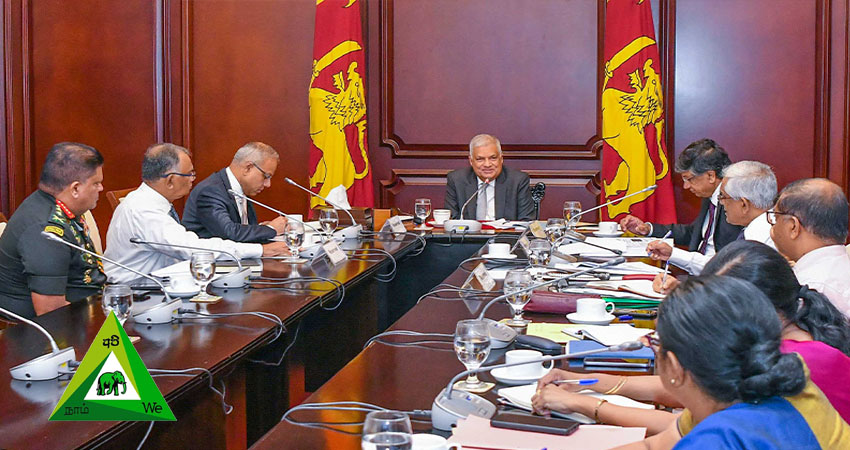President Calls for Council to Boost Efficiency in Agricultural Modernization

President Ranil Wickremesinghe has declared the formation of an Agricultural Modernization Organization Council, which will be chaired by both the President and Prime Minister. The primary objective of this council will be to oversee the restructuring of ministries, institutions, and organizations associated with agriculture in Sri Lanka.
President Wickremesinghe made this announcement during a progress review meeting of the Agriculture Modernization Program held at the Presidential Secretariat (03). He emphasized that the establishment of this new council aims to enhance the efficiency of government institutions involved in the agricultural modernization initiative.
At the meeting, Senior Professor Gamini Senanayake, Chairman of the expert committee, presented the policy framework devised for the modernization of the agriculture sector in Sri Lanka to the President.
The policy framework devised for the implementation of the agriculture modernization program in Sri Lanka encompasses various key objectives. These include enhancing productivity and efficiency, promoting sustainability and resilience, fostering inclusive growth and rural development, ensuring food security and nutrition, improving market access and trade, strengthening institutional capacity and governance, and fostering innovation and entrepreneurship.
During discussions, it was revealed that 26 projects have been meticulously chosen from 26 Divisional Secretariat divisions, covering all 25 districts, for the initial implementation phase of the agricultural modernization program. Funds have already been allocated to kick-start these pilot projects, indicating a proactive approach towards achieving tangible results.
President Wickremesinghe emphasized the necessity of transitioning from subsistence agriculture towards a more modernized approach that encompasses both large-scale and small-scale operations. He underlined the pivotal role of the agricultural export sector in the national economy, highlighting the urgent need for the rapid transformation of agriculture to align with the broader economic development agenda of the country.
During the deliberations, significant emphasis was placed on advancing and refining various facets of agriculture, encompassing paddy cultivation, other agricultural crops, as well as dairy production and animal husbandry. The participants explored avenues to modernize these sectors, aiming to enhance their efficiency, productivity, and sustainability.
Moreover, discussions revolved around the allocation of 500,000 acres of new land for cultivation, indicating a concerted effort to expand agricultural activities in Sri Lanka and address emerging agricultural challenges. Plans were also devised to educate and train farmers across the nation in modern agricultural techniques, underscoring the importance of equipping them with the necessary skills and knowledge to thrive in evolving agricultural landscapes.
Additionally, President Wickremesinghe engaged with officials on the potential for leveraging support from the private sector and attracting foreign investments to drive the agricultural transformation process forward. He highlighted the importance of prompt restructuring of public institutions to facilitate the establishment of public-private partnerships and foster cooperation, signalling a collaborative approach to address agricultural development needs.
In addition to modernizing agricultural practices, discussions also centred on the importance of value addition to agricultural products and the exploration of export opportunities. Collaborative efforts with the private sector were highlighted as a means to streamline processes and eliminate or restructure redundant public institutions, thereby fostering a more efficient and responsive agricultural ecosystem.
President Wickremesinghe underscored the critical role of water management, particularly in the face of climate change, emphasizing the need for the implementation of advanced strategies to ensure sustainable water usage in agricultural activities. Furthermore, the President’s attention was directed towards resolving pressing issues related to land ownership for farmers, facilitating access to modern machinery essential for agricultural modernization, and encouraging youth participation in agriculture through supportive initiatives.
To expedite progress in these areas, the President instructed officials to prepare and submit proposals related to the overall plan within two weeks. He expressed his intention to discuss these proposals with relevant ministries and seek Cabinet approval, underscoring the government’s commitment to advancing agricultural modernization initiatives in Sri Lanka.
Furthermore, President Wickremesinghe affirmed his commitment to transparency and accountability by stating his intention to present the proposal to Parliament. Prior to this, relevant parliamentary oversight committees will be given the opportunity to review the proposal, ensuring comprehensive scrutiny and input from stakeholders. Highlighting the overarching objective of the program, the President reiterated that its aim is to modernize agriculture, boost rural economy, and alleviate poverty by integrating agriculture into the country’s economy effectively.
The discussion saw the participation of key officials, including President’s Secretary Saman Ekanayake, Senior Adviser on Economic Affairs Dr. R.H.S. Samaratunga, Senior Advisor on National Security and Chief of Presidential Staff Sagala Ratnayaka, Senior Additional Secretary Chandra Herath, Chief of Defence Staff General Shavendra Silva, alongside other representatives from relevant government institutions and private sector entities engaged in the agriculture sector.





